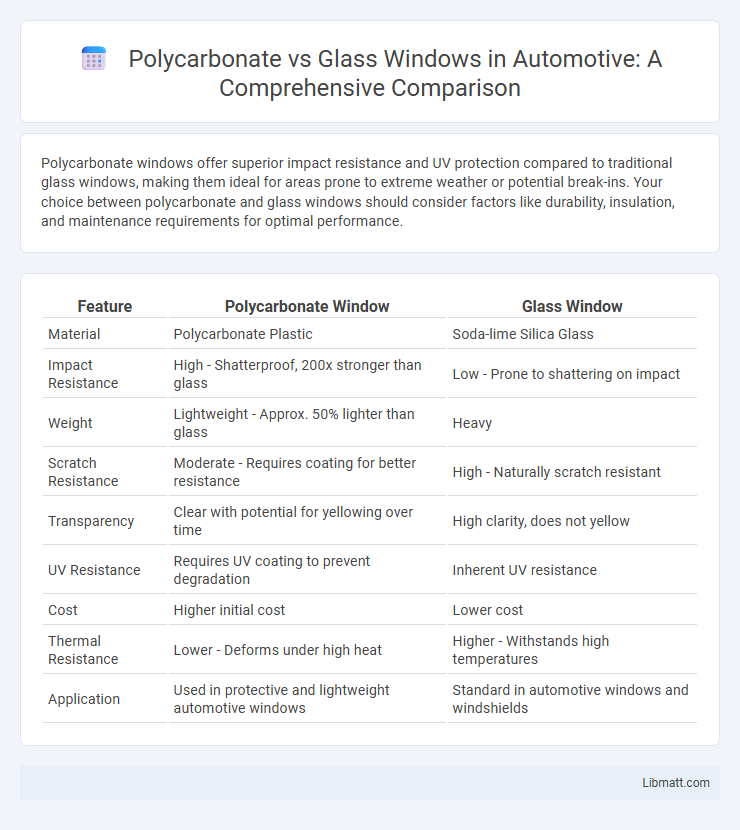Polycarbonate windows offer superior impact resistance and UV protection compared to traditional glass windows, making them ideal for areas prone to extreme weather or potential break-ins. Your choice between polycarbonate and glass windows should consider factors like durability, insulation, and maintenance requirements for optimal performance.
Table of Comparison
| Feature | Polycarbonate Window | Glass Window |
|---|---|---|
| Material | Polycarbonate Plastic | Soda-lime Silica Glass |
| Impact Resistance | High - Shatterproof, 200x stronger than glass | Low - Prone to shattering on impact |
| Weight | Lightweight - Approx. 50% lighter than glass | Heavy |
| Scratch Resistance | Moderate - Requires coating for better resistance | High - Naturally scratch resistant |
| Transparency | Clear with potential for yellowing over time | High clarity, does not yellow |
| UV Resistance | Requires UV coating to prevent degradation | Inherent UV resistance |
| Cost | Higher initial cost | Lower cost |
| Thermal Resistance | Lower - Deforms under high heat | Higher - Withstands high temperatures |
| Application | Used in protective and lightweight automotive windows | Standard in automotive windows and windshields |
Introduction to Polycarbonate and Glass Windows
Polycarbonate windows are made from a durable, lightweight thermoplastic material known for high impact resistance and excellent UV protection, making them ideal for safety and energy efficiency. Glass windows, typically manufactured from silica-based materials, offer superior clarity and scratch resistance but are more fragile and heavier. Your choice between polycarbonate and glass windows should consider factors like durability, insulation, and aesthetic preferences based on the specific application.
Material Composition and Properties
Polycarbonate windows consist of a durable thermoplastic polymer known for high impact resistance and excellent UV protection, making them lighter and more shatterproof than traditional glass windows made primarily of silica-based materials. Glass windows offer superior scratch resistance and better optical clarity but are more prone to breaking under impact due to their brittle nature. Your choice depends on whether you prioritize lightweight durability with polycarbonate or the classic transparency and hardness of glass.
Durability and Impact Resistance
Polycarbonate windows offer superior durability and impact resistance compared to traditional glass windows, making them highly effective in withstanding harsh weather conditions and physical impacts. Their inherent toughness reduces the risk of cracking or shattering, providing enhanced safety and longevity for your property. Choosing polycarbonate windows can significantly extend the lifespan of your window installations while maintaining clarity and strength.
Thermal Insulation and Energy Efficiency
Polycarbonate windows offer superior thermal insulation compared to traditional glass windows due to their multi-wall structure, which effectively reduces heat transfer and maintains indoor temperatures. This enhanced thermal performance contributes significantly to energy efficiency by lowering heating and cooling costs in your home or office. Choosing polycarbonate windows supports sustainable energy use while ensuring better temperature control year-round.
Weight and Installation Process
Polycarbonate windows are significantly lighter than glass windows, typically weighing up to 50% less, which simplifies handling and reduces structural load. This weight advantage allows for quicker and easier installation, often requiring fewer support materials and less labor time. Glass windows, being heavier and more fragile, demand more careful handling and stronger framing, extending installation duration and effort.
Safety and Security Features
Polycarbonate windows offer superior impact resistance and shatterproof qualities compared to traditional glass windows, making them ideal for enhanced safety and security in homes or commercial buildings. Their ability to withstand high force without breaking reduces the risk of injury and prevents easy break-ins, providing added protection for your property. In contrast, glass windows, while aesthetically pleasing, are more prone to shattering on impact, compromising both safety and security.
Light Transmission and Clarity
Polycarbonate windows offer approximately 90% light transmission, providing excellent clarity while maintaining high impact resistance, making them ideal for safety-focused applications. Glass windows typically allow 80-90% light transmission with superior optical clarity and minimal distortion, favored in architectural designs for aesthetic purposes. Despite slight differences in clarity, polycarbonate's durability under UV exposure ensures longer-lasting transparency compared to glass, which can be prone to breakage and requires more maintenance.
Maintenance and Lifespan Comparison
Polycarbonate windows require less maintenance than glass windows due to their high impact resistance and scratch-proof surface, reducing the need for frequent repairs or replacements. Glass windows may need regular cleaning and are prone to breakage from impacts or extreme weather, which can shorten their lifespan. You can expect polycarbonate windows to last significantly longer, often up to 10-15 years more than standard glass windows under similar conditions.
Cost Analysis and Long-Term Value
Polycarbonate windows typically cost 30-50% less upfront compared to glass windows while offering superior impact resistance and UV protection, making them a durable choice for long-term use. Glass windows, though initially more expensive, provide better scratch resistance and clarity, which can enhance property value over time in premium installations. Your decision should weigh initial cost savings against longevity and maintenance needs to maximize overall value.
Best Applications for Polycarbonate and Glass Windows
Polycarbonate windows excel in environments requiring high impact resistance, such as schools, sports facilities, and security installations, due to their shatterproof and lightweight properties. Glass windows remain ideal for residential and commercial buildings where clarity, aesthetic appeal, and UV resistance are crucial, offering superior optical quality and scratch resistance. Choosing between polycarbonate and glass windows depends on balancing factors like durability needs, visual clarity, and environmental exposure.
Polycarbonate window vs Glass window Infographic

 libmatt.com
libmatt.com